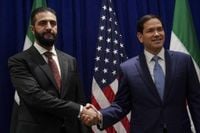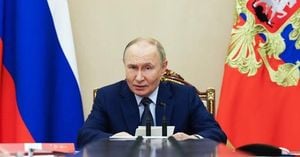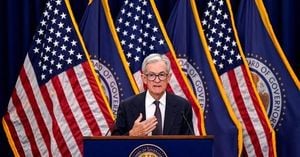In a move signaling a dramatic shift in Middle Eastern diplomacy, Syrian President Ahmad al-Sharaa met with U.S. Secretary of State Marco Rubio in New York on September 22, 2025, during the 80th United Nations General Assembly. The encounter marked the first time in nearly six decades that a Syrian leader has participated in the high-level annual U.N. meeting—a milestone underscoring Syria’s slow but steady emergence from years of international isolation.
The last time a Syrian head of state attended the U.N. General Assembly was in 1967, predating the Assad family’s 50-year reign. That long absence ended after al-Sharaa led a lightning insurgent offensive in December 2024, toppling Bashar Assad and bringing an end to nearly 14 years of brutal civil war. According to the Associated Press, al-Sharaa’s rise has prompted a flurry of diplomatic activity aimed at reintegrating Syria into the global community, though his past remains a subject of intense scrutiny.
Al-Sharaa’s history is undeniably complex. He formerly led the rebel group Hayat Tahrir al-Sham, which was once designated by the United States as a foreign terrorist organization due to its ties with al-Qaida. That designation, however, was lifted by the Trump administration, which also eased many longstanding sanctions on Syria. The stated goal, according to U.S. officials and cited by AP, was to encourage Syria’s transformation into a stable player in the Middle East following years of global isolation under Assad.
During their meeting at the Lotte New York Palace Hotel, Secretary Rubio emphasized the “opportunity for Syria to build a stable and sovereign nation following President Trump’s historic announcement earlier this year on sanctions relief for the Syrian people,” as reported in a State Department statement. The two leaders discussed a range of pressing issues, including ongoing counterterrorism efforts, the search for missing Americans, and the ever-sensitive topic of Israel-Syria relations and their impact on regional security.
Despite the thaw in some areas, al-Sharaa made it clear that Syria’s reintegration into the regional order would not be straightforward. At the Concordia Annual Summit—a global affairs forum in New York—he expressed skepticism about Syria joining the Abraham Accords, the U.S.-brokered agreements that saw several Arab states normalize relations with Israel during President Trump’s first term. “There’s a big difference between Syria and those members in the Abraham Accords,” al-Sharaa told the audience. “Syria is different. And those who are part of the Abraham Accords are not neighbors to Israel. Therefore, Syria as a neighbor has been subjected to over 1,000 raids, strikes and Israeli incursions.”
He elaborated further, insisting, “Syria has to be respected in this new era. There are different phases of negotiations with Israel to go back to the truce of 1974.” These comments highlight the delicate balancing act al-Sharaa faces as he seeks both Western acceptance and regional legitimacy. Talks with the U.S. and Israel over a potential security arrangement are reportedly ongoing, with some sources suggesting an agreement could be finalized as early as this week.
Al-Sharaa’s appearance at the Concordia Summit was notable not just for his remarks, but also for his conversation partner: retired General David Petraeus. The two men have a history on opposite sides of conflict, with al-Sharaa once imprisoned by American forces as an al-Qaida militant and Petraeus serving as the architect of U.S. military strategy in Iraq and Afghanistan. Their meeting in New York, two decades after fighting on opposing sides, was a striking symbol of the new political realities taking shape in the region.
In a moment that drew attention from both American and international observers, al-Sharaa praised former President Trump—whom he met in Saudi Arabia in May—for taking a “bold decision” to lift many sanctions against Syria. “I think Syria deserves a new opportunity,” he declared. Still, he was quick to note that some sanctions remain, and he urged the United States to remove them, arguing that the Syrian people need help as they emerge from war and crisis. “The Syrian people should not be killed another time through the sanctions,” al-Sharaa insisted. “The Syrian people love work. Lift the sanctions and don’t worry about them.”
Practical obstacles remain, even as diplomatic doors open. The State Department had to waive Assad-era visa restrictions for al-Sharaa and his delegation so they could attend the U.N. General Assembly. With the meeting set to begin in earnest on September 23, 2025, the move signaled a willingness by Washington to engage, even as some penalties linger. Al-Sharaa also met in New York with Senator Jeanne Shaheen and Representative Gregory Meeks, both ranking Democrats on their respective foreign relations committees. According to a statement from the Senate committee, Shaheen stressed the importance of passing legislation she is co-sponsoring to lift the remaining penalties still in place against Syria.
Yet, as Syria seeks a new place in the world, the legacy of its long conflict continues to cast a shadow. When asked about atrocities committed against minorities in the coastal region and the southern province of Sweida—incidents that have caused alarm in the U.S. and elsewhere—al-Sharaa acknowledged the gravity of the situation. “There was major chaos and everyone made mistakes,” he admitted. In a significant departure from past policy, he noted that for the first time in 60 years, Syria has allowed international fact-finding teams into the country to investigate such abuses. “The Syrian state will work on accountability against those found guilty even if they were the closest people to us,” al-Sharaa pledged.
The diplomatic thaw is not without its critics, both in the U.S. and abroad. Some American officials remain wary of al-Sharaa’s past and the speed of Syria’s rehabilitation. Human rights advocates have called for greater transparency and accountability before sanctions are fully lifted. Meanwhile, regional powers are watching closely to see whether Syria will align itself more closely with the West or maintain a more cautious, independent posture—particularly regarding Israel and the broader Abraham Accords framework.
Still, the symbolism of the moment was hard to miss. After years of devastating conflict, shifting alliances, and international isolation, Syria’s new leadership is making moves—however tentative—toward a different future. Whether this marks the beginning of lasting change or merely a brief pause in a long saga remains to be seen. For now, the world is watching, waiting to see if Syria’s new era will bring the stability and accountability its people have long sought.




